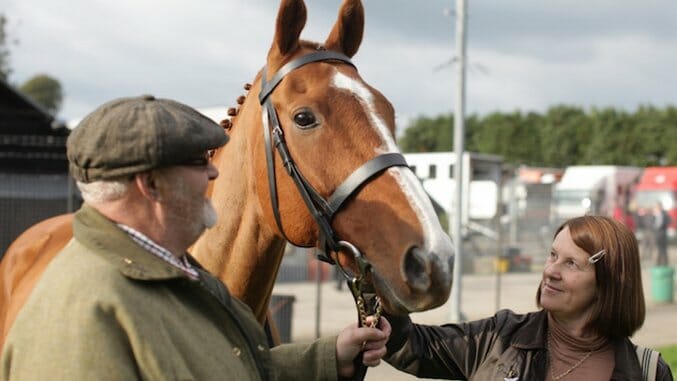
The tale of Louise Osmond’s documentary Dark Horse begins in 1999 when Jan Vokes, a barmaid in Cefn Fforest in South Wales, decides she wants to breed a thoroughbred racehorse. While she’d previously bred whippets and racing pigeons, horses are a completely different game. For one, they’re significantly more expensive to breed and raise. It’s not a pastime for the layperson.
But Jan was determined. She’d gotten married early and had children early and was ready to take a chance on something new. Not only that, she’d never really felt treated like her own person. She’d always been someone’s daughter, sister or wife, and this was an opportunity to do something for herself, as herself.
Jan’s husband, Brian “Daisy” Vokes, was pretty sure his wife had lost her mind, but in the first five minutes of Dark Horse it becomes clear that once she’s got her heart and mind set on something, Jan is not one to take “no” for an answer. Not only that but Brian, a former horse-and-cart driver, bought his first horse when he was 15 and has long had a special connection with animals in general. You get the feeling that convincing him wasn’t the hardest day’s work Jan’s ever done.
Jan and Brian are two of the most colorful and overall lovely human beings you’re likely to find in the world of horse racing. She’s a barmaid and cleaner at the local supermarket, while he’s a heavily tattooed former coal deliveryman and nightclub bouncer with more gums than teeth. An unlikelier pair of thoroughbred horse breeders you’re not likely to find, and a blessing to any documentarian. It’s hard to get enough of them.
Jan also recruits Howard Davies, a local tax consultant who’s had some experience with owning horses and running a syndicate, a form of horse ownership where a group of people buy shares in the steed, thus spreading out the cost of the endeavor. It didn’t turn out so well for Howard in the past, and he—rather, his wife—takes a little convincing.
After buying a 13-year-old mare called Rewbell for £350 (a fee Brian shrewdly negotiates down from £1,000), Jan, Brian and Howard form the syndicate of 23 friends and acquaintances who each buy in, agreeing to pay £10 per week to pay for Rewbell’s upkeep, the eventual stud fees and care for any resulting foal. Half of them think the tenner a week is a worthy investment just to see if it can be done.
To call a few of these folks “scruffy” wouldn’t be unduly harsh, and compared to the toffs who are generally in the owners’ boxes at races, these giddy and vibrant residents of Cefn Fforest wear their scruffiness as a badge of pride. Like the hodgepodge Bad News Bears of racehorse owners, you can’t help but root for them.
Dark Horse is about significantly more than just horse racing, and the all-out improbability of the tale and its appeal is also largely due to the “stuff it up your jumper” attitude that these working-class residents have toward the hoity-toity horse racing establishment. Both bordering on caricature and eminently believable, the story about the first time they attended a big race as owners is a joy.
Foaled in 2001 and dubbed Dream Alliance by Jan, the colt was sired by Bien Bien, an American turf horse who had won four Grade 1 races—no slouch in the dad department, then. The dam, on the other hand, was … less accomplished. Described as a horse that was “just mental” and would “rather run into a brick wall than jump it,” Rewbell had raced a total of three times, all dismal failures. But the combination of Bien Bien and Rewbell turned out to be magic, because Dream, as he’s generally referred to, was anything but a failure.
A mostly charming and exciting tale, The Dark Horse is not without its worrying and upsetting moments. Significantly more popular overseas than in the United States, jump racing is not for the faint of heart. Horses must not only jump over hurdles, but often must clear water traps on the far side and are frequently in crowded fields of 30-40 horses, especially in major races like the Grand National. The fatality rates in jump racing are vastly higher than those in flat racing and even when they aren’t injured, horses fall at an alarming rate. It’s hard to watch some of the footage here.
In the case of Dark Horse, clichés like “truth is stranger than fiction” and “you can’t make it up” couldn’t apply more aptly. This endearing and original documentary about the unlikeliest of thoroughbred horses and the Welsh barmaid who bred him simply wires the field in the Unbelievable Derby.
Director: Louise Osmond
Writer: Louise Osmond
Starring: Jan Vokes, Brian Vokes, Howard Davies
Release Date: May 6, 2016
Mark Rabinowitz is a Louisville-based freelance writer, publicist, film producer, (very) amateur handicapper and regular contributor to Paste. He is the co-founder of Indiewire.com and he’s not telling you his Derby pick. You can follow him on Twitter.